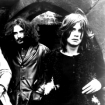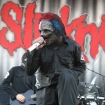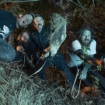The fact of the matter is that most supergroups aren't actually that super. Across all genres of music, we've seen time and time again that creativity can't be contrived like a magic potion just by putting a bunch of amazing players in the same room. No matter how great they are in their respective bands, there has to be actual chemistry between the musicians for something truly lasting to come out of it.
That said, when the pieces do, in fact, fit, the results can be fucking staggering. From A-list sludge maestros hailing the leaf, to grunge gods uniting to create new high-water marks, these are the 10 greatest supergroups in heavy-music history.
Audioslave
What do you get when you combine one of the greatest vocalists of his generation with one of the most innovative guitarists of his generation with one of the tightest, funkiest rhythm sections of their generation? Audioslave, of course. The unholy union of Soundgarden's Chris Cornell and the instrumental three-quarters of Rage Against the Machine, this supergroup amazingly lived up to its high-powered roster, with an uncanny ability to both shake rafters ("Cochise") and break hearts ("Like a Stone").
Bloodbath
Sweden is so packed with top-notch, co-mingling death-metal bands that it was probably only a matter of time before a few of the players teamed up to form a legit supergroup. Enter gorehounds Bloodbath. Members of Opeth and Katatonia hold down the instrumental portion of the band, while a murders' row of beastly vocalists have cycled through over the last 20-plus years: First, Opeth's Mikael Åkerfeldt, then Hypocrisy's Peter Tägtgren and, mostly recently, Paradise Lost's Nick Holmes. Perhaps most shocking of all: the last of these isn't Swedish at all! He's a Brit.
Brujeria
Most supergroups proudly proclaim their famous members. Brujeria have done their best to obscure them. Claiming to be a Mexican band comprised of FBI-wanted drug lords, the long-running, controversy-courting deathgrind cartel perform under pseudonyms and usually appear with their identities concealed behind bandanas and balaclavas. In truth, at least 20 musicians — many, not Mexican at all — have played among their ranks, including Faith No More's Billy Gould, Fear Factory's Dino Cazares, Carcass' Jeff Walker, Napalm Death's Shane Embury and Cradle of Filth's Nick Barker.
Down
If you asked someone to name the best Southern metal bands of all time, their list would probably look a lot like the groups that've lent members to Down: Pantera, Corrosion of Conformity, Crowbar and Eyehategod. Those bands' Philip Anselmo, Pepper Keenan, Kirk Windstein and Jimmy Bower are the masters of Southern-fried riffage and swinging grooves, and when they all got together for their 1995 debut, NOLA, they produced something that even rivals the best material from their respective main bands. Down don't come together to play live often these days, but if you get the chance, do not miss them.
Fantômas
Mike Patton is a man of a thousand voices and even more projects — many of them supergroups. Our favorite of that category is Fantômas, the Faith No More/Mr. Bungle frontman's avant-metal Voltron with OG Slayer drummer (and Patton's Dead Cross bandmate) Dave Lombardo, Melvins' Buzz Osborne and Bungle's Trevor Dunn. Each of their four albums is insane in its own right, but it's hard to top the gleeful, fiendish genius of 2001's The Director's Cut, featuring this all-star team's thrilling takes on the themes from iconic horror movies and TV series.
Killer Be Killed
Simply put, Killer Be Killed boast three star-quality frontmen and one of the best drummers of all time. Max Cavalera (Sepultura, Soulfly), Greg Puciato (Dillinger Escape Plan), Troy Sanders (Mastodon) and Ben Koller (Converge) all come from different metallic backgrounds, and each have wildly eclectic tastes, but they work surprisingly well as a unit, whether on their fiery 2014 self-titled debut (featuring the Mars Volta's Dave Elitch on drums) or their more adventurous 2020 knockout, Reluctant Hero. If you dig any of their individual bands, you'll dig KBK — even if it doesn't actually sound like any of their other bands.
Mad Season
Grunge came out of a tight-knit community where everyone played in and around each other's bands, and that cross-pollination continued even when they all became international phenoms. Formed in 1994 — when at least two members were genuine rock stars — Mad Season featured Alice in Chains' Layne Staley, Pearl Jam's Mike McCready, Screaming Trees' Barrett Martin and a sound that combined all their talents into one big, steamy Seattle soup. Their sole album, 1995's Above, spawned the radio smash "River of Deceipt," but the band was soon taken down by that bane of the grunge scene: heroin.
Nailbomb
Max Cavalera gets around. Before he left Sepultura and pursued a prolific career spanning Soulfly, Cavalera Conspiracy and the aforementioned Killer Be Killed, the Brazillian trailblazer dabbled with industrial metal in his short-lived duo with Fudge Tunnel's Alex Newport. They famously only released one studio album, 1994's savage Point Blank, and played one show (immortalized on the live record Proud to Commit Commercial Suicide), Even so, their impact can still be felt today in all the young bands who periodically try to outmatch the thrashy, death-metal-infused industrial mayhem that was Point Blank. Good luck.
Pigface
Formed in 1990 by Ministry touring members Martin Atkins and William Rieflin, industrial-rock supergroup Pigface has seen more than 100 different musicians pass through its ranks, including Trent Reznor, Flea, TOOL's Danny Carey, Lamb of God's Randy Blythe, Godflesh's Justin Broadrick and many, many, many more. While best known for its wild live shows, the shape-shifting collective has at least one genre-defining classic album to its name, 1993's Fook, plus an underground hit single, "Suck," which was co-written and sung by Reznor, who later re-recorded it for Nine Inch Nails' Broken EP.
Temple of the Dog
Long before Audioslave, Soundgarden's Chris Cornell helmed another hard-rock all-star team: Temple of the Dog. Conceived as a tribute to late Mother Love Bone singer Andrew Wood, the group's lone LP, 1991's self-titled offering, features two former members of Wood's band and all five future members of Pearl Jam, including a then-little-known singer named Eddie Vedder. Timeless grunge anthems like "Hunger Strike," "Say Hello 2 Heaven" and "Call Me a Dog" rank Temple of the Dog among not only the greatest one-album wonders of all time, but also the superest of supergroups.
Them Crooked Vultures
Them Crooked Vultures are a real-life manifestation of a rock nerd's wet dream. "What would happen if you combined Led Zeppelin, Foo Fighters and Queens of the Stone Age?" Voilà. The band helmed by John Paul Jones, Josh Homme and Dave fucking Grohl have only dropped one record, 2009's self-titled, which is understandable given their schedules. But seriously, this is one of those instances where it's almost a scientific impossibility that a grouping of talent wouldn't produce something amazing, and songs like "No One Loves Me and Neither Do I" and "New Fang" are, in fact, total ass-beaters.
Velvet Revolver
In 2002, Guns N' Roses' Slash, Duff McKagan and Matt Sorum embarked on an exhaustive search for a vocalist for their then-yet-to-be-named new band, a process chronicled by VH1. The following year, after Stone Temple Pilots disbanded, they nabbed their white whale, Scott Weiland, who had originally declined to audition while STP was still active. Dubbed Velvet Revolver — a perfect moniker for their glammy, dangerous sound — the supergroup won a Grammy for 2004's "Slither," but eventually fell into disarray due to Weiland's drug abuse. When he passed in 2015, any hope of a long-rumored VR reunion died with him.












